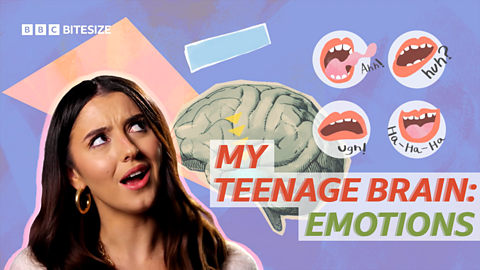For 40 years, the BBC One soap EastEnders has brought dramatic stories into our living rooms - often reflecting issues that families are dealing with in real life.
To mark this anniversary, BBC Bitesize showed scenes from the series to secondary school students - to get their reactions - which you can watch below. The videos raised lots of questions about how much parents and carers should get involved when their kids fall out with their friends. Parents’ Toolkit spoke to Dr Dan O’Hare, an educational psychologist from the University of Bristol for advice:
Teens react to the fight.
Davinder (aka 'Nugget'): How are you doing, brother?
Avani: Oi, Denz. You know you've gone viral, bro. I can't lie, it wasn't funny last night, but watching it back today.
Denzel: Avani, turn it off.
Avani: Come on man, don't be like that.
Denzel: It's not funny.
Students: Ohh.
Student 3: I will tell the other person to delete the video.
Student 4: Yeah.
Student 3: Cos that's not right.
Denzel: Get out my face, man.
Davinder: What is that?
Student 3: Oh, scrap!
[Inaudible]
Avani: Stop!
Student 5: It's embarrassing.
Davinder: When the man dem come through, you go mute.
Student 3: Come on now.
Denzel: Man.
Avani: Get off him!
Student 8: I don't like fighting.
Student 9: I'd drag both of them into a room, and I'd be like. Right. Both of yous have told me that this happened. So you're gonna sort it out!
Student 12: Sometimes it's just daft little reasons, but problems can always be resolved. So just violence is just not the answer.
Student 14: Have a chat about what happened and how you can solve that and make an agreement so you can't so you don't argue anymore.
Student 13: Damn, you know how to be a bigger person. Because if it's me, I'm being petty.
Teens react to parents and carers stepping in.
Patrick: Denzel, there's somebody here who wants to apologise.
Avani: You nearly smashed my phone. I was only watching the fight from last night.
Ravi: And I've made it clear to Avani that she will not be spending time with those people again.
Davinder (aka 'Nugget'): He started it.
Denzel: He reckons I'm a coward.
Davinder: You are!
Denzel: Huh? I swear. Say that again.
Ravi: Listen, you're in someone's house. Have some respect.
Student 1: Definitely have respect.
Student 2: Exactly. Respect your elders.
Student 4: Because when you involve parents, that's when you know it's serious.
Student 3: Yeah.
Student 4: …and that could sometimes cause a bit of tension between you.
Student 6: It was important that they stepped in because it got physical. Um, but if it was just emotional with me and my friend, I would rather my parents just stayed out of it.
Student 8: I mean, if it's a situation where it is quite serious in that clip, then sure like parental advice could be like, definitely a bit like a big hand.
Student 6: I think we're at the age now where we're mature enough to deal with it on our own, when we don't need our parents to step in. But if it got to a serious point where it became like bullying or anything, I think a parent should step in.
When should we leave kids to sort it out between themselves?
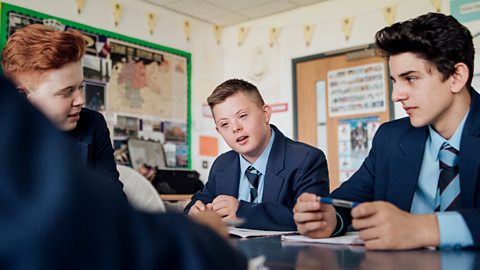
“I work with children and young people, from nought to 25,” Dr O’Hare begins, “and when I was watching these clips, it really does show how conflict often comes from a need.”
In this case, he explains, Avani has a need in making a connection, having banter and keeping up to date in regard to the video featuring Denzel that has gone viral. Alongside this, Dr O’Hare said, Denzel needed respect and self-esteem.
He continues: “It often comes from feeling an emotion strongly and I think there can sometimes be a view that conflict is to be avoided but, as an educational psychologist, I kind of think - why is conflict not always bad? It is a chance, as a young person, to develop communication skills, develop emotional understanding, to problem solve, to work out what boundaries are.”
Why are teenage brains so emotional?
The EastEnders clip shows how the situation between the three characters quickly becomes violent when Denzel knocks the phone from Avani’s hand and Nugget jumps to her defence by attacking Denzel.
Dr O’Hare argues that if the situation had not turned into a fight, there may not have ever been a need for adults to become involved: “Letting children, to some extent, sort this out themselves, it’s recognising that [conflict] is inevitable, it’s something they’re going to have to deal with throughout their lives. So, it’s an opportunity to develop those skills already mentioned - communication and emotional understanding.
“Up until the violence, that’s the part where I would have said, you can let them work it out. But I think that, with violence, that is the stage adults coming together to support resolution and restoration is important.”

What should adults do if they step in?
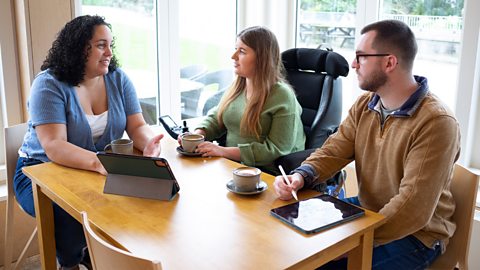
“If two adults publicly fight,” said Dr O’Hare, “they can get arrested and charged. We need to think about the skills that young people are developing and taking forward. Adult involvement in this is probably a given.”
Based on the second clip the students watched, Dr O’Hare agrees that if a group of adults need to come together to discuss their children’s differences, it is better to meet face-to-face, although he feels it should be done in a certain way.
He explained: “It wasn’t [in EastEnders] on neutral territory, it was in somebody’s house, which I think is probably not a good decision. I also didn’t get the sense that it was planned, they just kind-of turned up. If you catch another parent at the school gate because your kid was hit yesterday, they’re rushing out - what kind of response are you going to get if you say, ‘hey, your kid hit my kid’? You’re going to get aggression, you’re going to get defensiveness.”
Instead, Dr O’Hare suggests both parties organising to meet on neutral territory at a future date, face-to-face, with the focus on reaching a common goal that the situation is never repeated.
One kid standing up to another might be violence to one family, but to another, that might be courage. If people’s values feel threatened, it can lead to a tricky conversation." - Educational psychologist, Dr Dan O’Hare
“It’s really hard, I know,” Dr O’Hare continues, “sometimes we’re asking a lot from parents and carers and what we’re talking about here is the expression of people’s values. One kid standing up to another might be violence to one family, but to another, that might be courage. If people’s values feel threatened, it can lead to a tricky conversation. That’s when you can stick with what we call I-statements."
An I-statement involves somebody saying what they feel about a situation, rather than apportioning blame (e.g. ‘you did this’ or ‘you did that’) to someone else. When parents and carers discuss a fight between their children, Dr O’Hare suggests I-statements such as, “When I heard about this, I felt really embarrassed,” or, “When it happened, I felt really worried for them,” may be useful for when children have been fighting.
Ultimately, before any discussions between adults takes place, it’s perhaps worth considering if the situation demands it. Dr O’Hare says: “How valuable is it to be to be involved in this?
“Is it somebody you're going to have to see every single day? Is it somebody where the conversation might not go very well? Was it a one-off physical thing, perhaps while on holiday and you'll never see them again? I think there's a decision that an adult needs to make about how much worth their involvement has - and that is also related, I guess, to the severity of the conflict.”

When should parents involve school in children’s arguments?
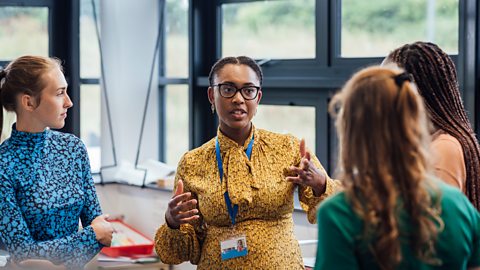
As Dr O’Hare suggests, when two pupils in school uniform are involved in a fight in broad daylight, there's a possibility that the school could get involved regardless - and it’s even more likely if it happens on school property.
He says: “If those fights have happened in school, then there is likely to be more formal sanctions, such as detentions. Then, it would be for the adults and carers to hopefully talk together about what is happening at school as well. Maybe there’s been bullying over a course of time, so I think if there’s something more severe, then a joint approach which involves the school, or key staff such as trusted teachers, can be useful. We know that stuff like this thrives when it’s not looked at and kind of hidden.”
School involvement can also be useful. Dr O’Hare points out that skilled staff are trained to help with emotional literacy that can aid communication skills, such as being more assertive, and counselling at school can also help.
Dr O’Hare says: “Sometimes, the structures in schools may provide a bit of objectivity and staff who are trained in supporting children and young people to think about their needs, and to communicate in those needs.
“Ultimately, we want the young people to learn from the experience. Sometimes, sanctions might not be logically connected to what happened. If two people have had a fight and they get Saturday detention, how does that help these young people problem solve?
“If I was a parent and carer, that's what I think I'd want the focus to be on - problem solving.”

Here is more information on bullying and how can parents tackle it with Harry Judd and Konnie Huq.
And our panel of parents and carers from around the UK share their thoughts on making friends with other parents.

Parents' Toolkit
Fun activities, real-life stories, wellbeing support and loads of helpful advice - we're here for you and your child.
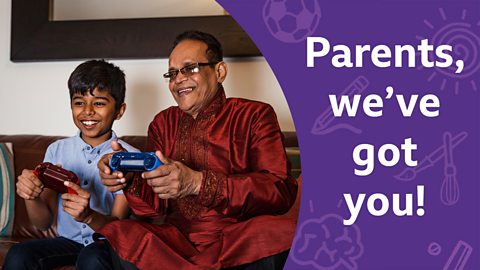
How to spot the signs of cyberbullying with Dr Anna Colton
Looking at the common signs of cyberbullying, and what can be done to help.
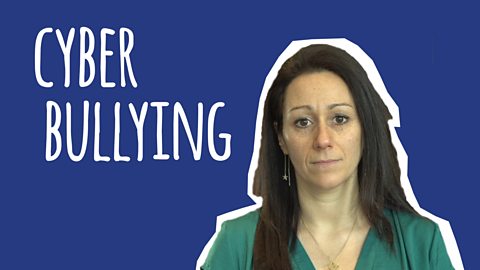
Encouraging kids to show kind behaviour online
Dr Linda Papadopoulos tells us why it's important for children to be kind to each other online and gives you the tools to help you have a conversation about kindness with your child.
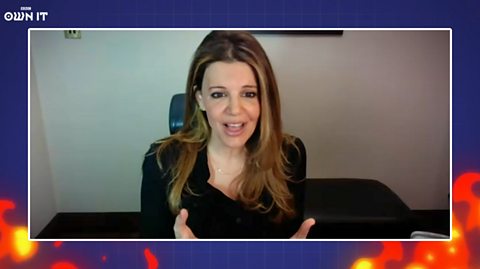
How technology has made parenting more difficult and how to navigate it
BBC Bitesize Parents' Toolkit looks at how widespread access to the internet for our children is causing clashes at home, with negative and positive aspects.
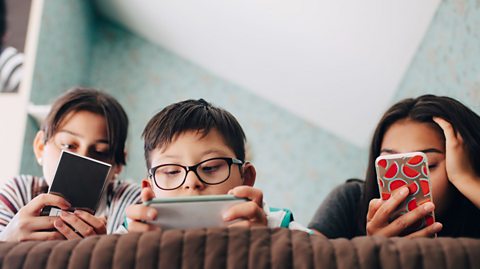
Supporting your child's device use as they start secondary school
Moving from primary school and into secondary school can be an overwhelming time for kids as their online world opens up, particularly if they’re getting their own phone for the first time.
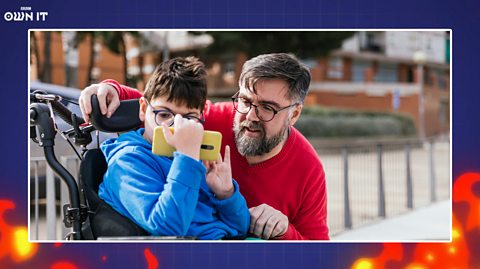
The teenage brain: How you and your child can understand the changes they're going through
The teenage brain: we've a series of films and articles you can use to help you and your child understand the changes they're going through - tantrums, anger and hurt may not be personal but part of a natural process in the brains of young people.
